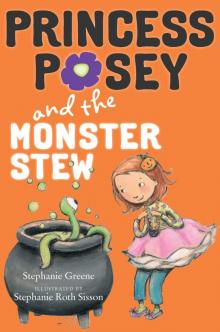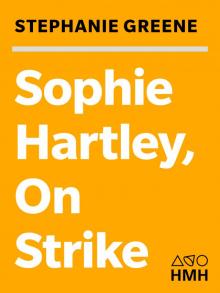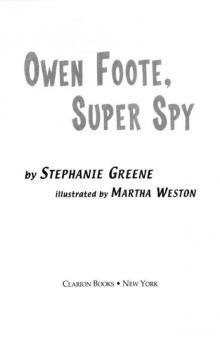- Home
- Stephanie Greene
Sophie Hartley, On Strike Page 7
Sophie Hartley, On Strike Read online
Page 7
Sophie fell asleep with a happy smile on her face. The smell of hot dogs and ketchup wafting up from under her bed was even better than perfume.
It was the proud smell of a united front.
“Paper plates?” Alice said the next day, sitting down at the table next to Sophie. “Your mother?”
“I put a stack of them on the kitchen counter this morning,” Sophie reported. “Mom didn’t say a word. Not even when John took his breakfast outside to eat on the porch, like a picnic.”
“What’s so bad about paper plates?” said Jenna. She sat down on Sophie’s other side. “At my house, we eat right out of the bags sometimes.”
“For Sophie’s mother not to say anything is really bad,” Alice said.
“Maybe she’s as stubborn as Sophie,” Jenna said.
Sophie got a horrible, sudden image of two bulldogs, nose to nose, growl to growl, neither one willing to give in. “I think she’s ready to crack,” she said quickly, blinking it away.
“Cool,” said Jenna. “What’re your demands going to be?”
“I don’t like to think of them as ‘demands,’” Sophie said cautiously, picturing the expressions on her parents’ faces if she were to even say the word.
“That’s what they’re called,” Jenna insisted. “You’re not getting cold feet, are you?”
“Maybe you should call them requests,” said Alice.
“Only you would call a demand a request, Alice,” said Jenna.
“Well, you make everything sound like a demand, Jenna.”
“What do you think a strike is about?” Jenna retorted.
“You don’t know everything.”
“No fighting.” Sophie held out her arms like a referee at a boxing match as they leaned across her. “I have enough of that at home.”
There was a stiff little silence from either side.
It felt wonderfully familiar. Sophie felt the three-legged table wobbling and knew exactly what to do.
“I think you should demand an apology from Jenna, Alice,” she said, turning to her left, “and I think you should request Alice not to be so demanding,” she said to Jenna.
They both thought Sophie was hilarious. They all sat around saying silly things for a while, just for the pleasure of laughing.
Lunch ended on a very cheerful note.
The sight of her father’s truck in their driveway after school brought Sophie crashing back down to earth.
She rounded the corner of the house, and found Nora, Thad, and John waiting for her on the back porch. They were sitting in a disapproving row on the top step. “What’s Dad doing home?” she asked, slowing to a crawl. “What’s everybody looking at me for?”
“He lives here, remember?” said Nora.
“The jig’s up, Soph.” Thad flashed a quick smile.
“Yeah, you big troublemaker,” John said.
Sophie’s heart sank. “What happened?”
“John’s insulted because Dad told him to go away when he knocked on their bedroom door,” Nora told her.
“You didn’t really think we could keep it up when Dad got home, did you?” said Thad.
“I don’t see why not,” Sophie said.
“Dad and paper plates?” Nora shook her head. “I don’t think so.”
“Nora’s right.” Thad stood up and walked around behind Sophie. He clamped his hands firmly on her shoulders to discourage any thoughts of escape, and began pushing her toward the house. “You’ve got to go in there and negotiate, Soph,” he said encouragingly. “You can do it.”
“Right. Knock ’em dead,” Nora shifted to one side to let Sophie up the steps.
“Why me?” asked Sophie, looking around, in vain, for any signs of support.
“You’re our one-and-only strike organizer,” said Thad.
“Our one-and-only Little Miss Strike Authority,” agreed Nora.
“You started it,” said John.
“Oh, all right.” Sophie reluctantly opened the door. “But what are our demands?”
“A Ferrari,” said Thad as he settled down happily to wait. “Navy blue.”
“The right to take a shower without wearing flip-flops,” said Nora.
“Torpedoes,” said John. “Tyler and me need more torpedoes.”
“Ah, Sophie.”
From the sound of her father’s voice, Sophie could tell her parents had been expecting one of their children to show up; they just hadn’t known which one. They sat side by side on the edge of their bed, smiling at her.
“What can we do for you?” said Mr. Hartley.
“I came to see if you’re ready to negotiate,” she said gruffly. She was wearing her Leader-of-the-Pack face.
“What’s wrong with your teeth?” her mother asked.
“Nothing.”
“Oh. Well, I don’t think I’m ready to negotiate. Are you, dear?” Mrs. Hartley said, turning to her husband with a bright smile.
“Not me.”
“Then not me, either.”
They both smiled at Sophie again.
With their huge, expectant smiles, they reminded her of wolves. Sophie felt a queasy stirring in her stomach. As if a huge crater, like the ones she’d seen in photographs of earth quakes, was slowly opening up in the floor at her feet.
“You aren’t?” she said.
“Not at all.” Her mother beamed. “I’ve just been telling Dad what an interesting learning experience this has been. Haven’t I, dear?” She patted Mr. Hartley’s hand.
“I would say that Mom’s eyes have been opened up in a most educational way,” he agreed.
The chasm was growing wider. Sophie didn’t dare look down. She was sure she’d see smoke rising out of it and a huge hand with warts on the knuckles reaching up to drag her in. “Like how?” she asked carefully.
“Well, you children know how hard Dad and I have been working lately,” her mother began, “and I know you understand that certain things need to be done in order to keep a household running. After all,” she said brightly, “except for Maura, none of you are babies anymore, are you?”
It was one of those questions that didn’t require an answer. Sophie felt the cold finger of fear draw its line down her backbone.
“But what I didn’t know,” her mother went on, her brow furrowing suddenly, as if the part she was coming to saddened her, “was how much you don’t know about cooperation! And family.” Her mother folded her hands in her lap. “I truly didn’t understand how little my own children know about family. I can’t tell you how instructive it’s been.”
There was a long silence in the room. Sophie was sure she could hear Nora and Thad and John breathing heavily at the bottom of the stairs. Since she was pretty sure the Ferrari, and the clean bathtub, and the torpedoes were out, she didn’t look forward to going back down to face them.
“So,” she said cautiously, trying to feel her way and having no idea of what to do next. “What are you going to do?”
Smiles cut her parents’ faces in two. Sophie knew that her side was sunk.
“We’re going on strike, too,” said Mrs. Hartley.
Chapter Eight
Sophie didn’t need an alarm clock to wake her up for school. The noisy sounds of life her family made in the morning were enough. The next morning, however, it was the silence that made her sit up.
Thad wasn’t pounding on the bathroom door, yelling that Nora had been in there for too long. Mrs. Hartley wasn’t calling up from downstairs that they were about to miss the bus. Nora wasn’t even pulling out one dresser drawer and then another and complaining loudly about not having anything to wear.
She was still asleep under her covers.
Sophie looked at the clock.
“Nora!” she shouted, scrambling out of her bed. “Get up! We’re late!” She shook Nora by the shoulders, making the whole bed shake. “It’s almost seven!”
Sophie dragged a T-shirt over her head. Shoving first one leg into her jeans and then the other, she hopped aro
und their room while Nora shrieked and ran into the bathroom. Sophie ran down the hall, banging on Thad’s and John’s door as she went, like a fireman alerting people to a fire in the house.
“Mom!” she called, pounding down the stairs. She ran into the kitchen and stopped. Her mother was peacefully reading the newspaper at the table with Maura in her highchair beside her. “Why didn’t you wake us up?” Sophie asked accusingly.
Mrs. Hartley looked at Sophie and smiled. She lifted up her mug and took a sip of her coffee. She leaned over and wiped cereal off Maura’s chin. Then casually, she said, “I don’t believe that’s my job anymore, is it?”
“That was so rotten,” said Nora as they hurried down the back steps. “I cannot believe Mom would sink that low.”
“They are on strike,” said Thad, taking a bite of the dry, untoasted bagel he had grabbed. “Although it certainly was an eye opener.”
Mrs. Hartley had laid out their demands to Sophie plainly and simply: She would continue to do the grocery shopping, since they all had to eat, but the children would be responsible for the cooking. They would fix their own lunch es, too, and do the laundry.
“I’m sure you’ll agree it’s only fair, since Dad and I earn all the money,” her mother said. “Of course, we’ll continue to contribute our paychecks to the running of the house. Although we’d much rather take a trip, wouldn’t we, dear?” she asked Mr. Hartley.
“I’ve always wanted to see Dublin,” he said.
Sophie had been too shocked to protest, but she had been thinking about it all night. “She didn’t say anything about not waking us up in the morning,” she said now, bringing up the rear. “I don’t think parents are even allowed to go on strike. I bet there’s a rule against it.”
“Show me the rule book,” said Thad.
“She’s really asking for it now,” Nora said. “My hair’s still damp. I didn’t even have time to put on my makeup.” She blinked a few times. “Well, I did have time to put on mascara, at least. But fine.” She held out her arm with her hand curled into a fist. “She wants war. We make war, right? All for one, one for all!”
Sophie tapped her fist against Nora’s and Thad’s, astonished. Suddenly, they had become the Three Musketeers. They would have to let John in, she thought as Nora and Thad headed for their bus and she got into the car to wait for her mother and John. That would make it Four Musketeers.
But still. She was gratified by the change in Nora. In the back of her mind, though, wiggling like a worm in the grass, was the worry about how long they’d be able to hold out.
“I’m not touching it,” Nora said. “You touch it.”
“Why should I touch it?” said Thad. “I cooked dinner the last two nights.”
“I thought they took the hair off,” said Sophie.
The raw chicken their mother had brought for them to cook for dinner lay on the cutting board in front of them. It looked more like a baby than a chicken. A naked baby, without a head. And with little hairs sticking out of it.
Sophie wasn’t crazy about the hairs.
“You only offered to cook so you could use the grill,” said Nora. “Anyway, hot dogs are more like plastic than real meat.”
“The hamburgers were real meat.”
“They didn’t look like cows, though, did they?” said Nora. “This looks like a dead chicken.”
“With its hairs still on,” added Sophie.
“Oh, Sophie, be quiet!” Nora ordered. “Chickens don’t have hair, they have feathers. Please, Thad,” she said, switching to her pleading voice. “You clean fish—”
“Fish don’t have arms and legs,” said Thad. “Call me when dinner’s ready.”
“Thad!” Nora cried. “Oh, I hate you!” She stamped her foot when the back door slammed and rounded furiously on the chicken as if she’d caught it trying to sneak away. “I’m not touching you, do you understand? You’re disgusting!”
Sophie, who’d been rummaging around in the cabinet under the sink, called out in triumph, “It’s all right! I can touch it!” She backed out, feet first, and held her hands up in the air like a surgeon preparing to operate. Their mother’s yellow dishwashing gloves came up to her elbows.
Quickly, so she wouldn’t feel the loose skin slipping around over the chicken’s bones, she picked it up and dropped it into the pan. Nora opened the oven door.
“Aren’t we going to put anything on it?” Sophie asked as Nora slid the pan inside and slammed the door shut.
“Like what, a blanket?”
“I think we were supposed to take out something from its stomach,” Sophie said doubtfully. “Mom uses it to make gravy.”
“Yes, well, Mom’s not doing the cooking tonight, now, is she?” said Nora, furiously punching the buttons on the stove. “And if you think I’m reaching inside that . . . thing’s . . . stomach, you’re crazy.” She untied the strings to her mother’s apron and draped it over a chair. “The cookbook said to start it at five hundred degrees. Make sure you turn the oven down to three-fifty in fifteen minutes,” she instructed as she picked up her purse and slipped her backpack over one shoulder. “And when the laundry’s done, make sure you put my white blouse in the dryer. On low. I need it for my concert tomorrow.”
Sophie trudged down the hall to the laundry room without complaining. It had only been two days, but everyone was getting grouchy. Thad had cooked for the first two nights, and Nora had done the laundry.
Today was Sophie’s turn. Nora had given her strict instructions about separating the whites from the coloreds, but that sounded like twice as much work, so Sophie had ignored it and thrown everything in together. She was feeling like both the cook and the cleaning lady as she opened the lid of the washing machine and began pulling out clothes.
Heavy, wet, pink clothes.
The higher the pile got, the pinker it looked. Upon closer inspection, Sophie discovered that she’d dyed not only Thad’s underwear pink but all of Nora’s white things, as well. She panicked and threw all of the pink garments back into the machine. She poured in two capfuls of soap, plus a third for good measure, and shut the lid again.
That should do it, Sophie thought grimly. I’m going outside.
She rode her bike around the block a few times until Nora yelled out their bedroom window something about her blouse. Sophie went back inside and found the floor of the laundry room covered with soapy water.
A veritable tidal wave of it was heading straight for the rug in the hall.
Sophie grabbed the dry laundry that was in the basket waiting to be folded and used it to mop the water up. As soon as the potential disaster was over and she saw the pile of now soggy clothing on the floor, she realized she was going to have to wash that pile again, after first rewashing the pink things in the machine to get the extra soap out.
“Sophie, stop it! You’ll wake Maura!” her mother ordered from the doorway to the laundry room. She flapped her hands and looked unsympathetically at Sophie, who was sitting on the damp floor. “What are you wailing about?”
Sophie sniffed. Then she frowned and sniffed again. A fierce frown wrinkled her face as realization dawned.
“Nail polish?” she said, outraged. “You’re putting on nail polish while I have to do the laundry and the cooking?”
The cooking.
The exact second Sophie remembered the chicken, the smoke alarm went off. She could hear people shouting in the kitchen above its piercing wail.
“Well, what’d you expect?” she growled unrepentantly when she arrived on her mother’s heels to see Thad carrying the smoking pan with the burned chicken out onto the back porch. “I can’t do all the work around here.”
When John heard that the things they’d left inside were the chicken’s heart, liver, and neck, he begged to be allowed to take them out and operate on them, but Mrs. Hartley made Thad throw everything away. They had peanut butter and jelly sandwiches for dinner, instead.
“I had peanut butter and jelly for breakfast, peanut b
utter and jelly for lunch, and peanut butter and jelly for dinner,” John said happily, gazing around the table at the less cheerful-looking members of the family. “I could eat peanut butter and jelly for the rest of my life.”
“At the rate we’re going, you might have to,” said Mr. Hartley.
“We need to talk.” Nora slapped her pencil down on her desk and swiveled around in her chair to look at Sophie. They had retreated upstairs to their bedroom the minute dinner was over. Sophie was glad for an excuse to stop working on the math problems she was having no success with, and put her pencil down, too.
“Talk about what?” she asked.
“We just can’t sit around waiting for one side to die of jelly poisoning,” Nora said. “Thad! Come in here!”
“Our side would probably win,” said Sophie. “I bet John’s immune to jelly poisoning by now.”
Thad came from down the hall and leaned against their door jamb. “Strike meeting?” he asked expectantly.
“We have to do something,” Nora said.
“Dad went out after dinner to find somewhere to watch TV that doesn’t make him sneeze,” Thad said. “He just came back.”
He and Nora exchanged glances. “Time for another negotiation session, Sophie,” they said at the same time.
“Not again,” Sophie groaned.
Thad took her gently but firmly by the arm and pulled her to her feet. “They’re in the family room,” he instructed as he pushed her slowly into the hall. “You go down . . . you tell them you’re worried we’re all losing weight . . .”
“That’ll get Mom, for sure,” agreed Nora, who had put her hands in the middle of Sophie’s back and was helping push. “Do whatever you have to. Yell. Beg. Cry. Try crying, Sophie. You’re good at that. Just don’t come back without a settlement.”
They reached the top of the stairs.
“You’re our fearless leader,” said Thad, standing next to Nora as Sophie started reluctantly down. “We’re with you all the way.”

 Christmas at Stony Creek
Christmas at Stony Creek Queen Sophie Hartley
Queen Sophie Hartley Princess Posey: Monster Stew
Princess Posey: Monster Stew Princess Posey and the Next-Door Dog
Princess Posey and the Next-Door Dog Princess Posey & the Tiny Treasure
Princess Posey & the Tiny Treasure Sophie Hartley and the Facts of Life
Sophie Hartley and the Facts of Life Princess Posey and the Flower Girl Fiasco
Princess Posey and the Flower Girl Fiasco Princess Posey and the New First Grader
Princess Posey and the New First Grader The Lucky Ones
The Lucky Ones Princess Posey and the Crazy, Lazy Vacation
Princess Posey and the Crazy, Lazy Vacation Owen Foote, Mighty Scientist
Owen Foote, Mighty Scientist Falling into Place
Falling into Place Sophie Hartley, On Strike
Sophie Hartley, On Strike Owen Foote, Super Spy
Owen Foote, Super Spy Princess Posey and the First Grade Ballet
Princess Posey and the First Grade Ballet Princess Posey and the First-Grade Boys
Princess Posey and the First-Grade Boys Happy Birthday, Sophie Hartley
Happy Birthday, Sophie Hartley